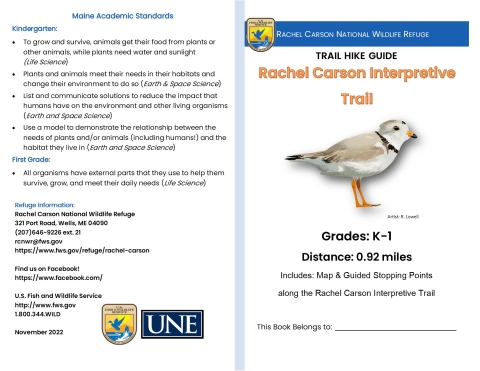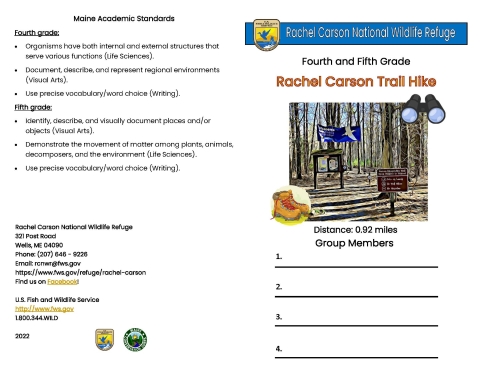Rachel Carson Wildlife Refuge provides a unique experience for youth of all ages to learn about wildlife in their natural habitat throughout the year. Its close proximity to Coastal Maine makes it an ideal destination for experiential outdoor learning. Engaging emerging audiences is not a matter or quantity, but quality. It is about planting the seed (knowledge) to inspire and participate in conservation.
Our objectives for these audiences are to:
- Cultivate a culture of inclusivity.
- Remove barriers to access.
- Improve programs currently offered as well as improve the Refuge experience.
- Create community-centered, authentic, and relevant programing.
Refuge staff believes that the majority of any culture is wrapped up in language and communications and with Portuguese identified as our emerging audience's first language, we designed and published our trail guides in English and Portuguese.
Curriculum-based Field Trips
Take your students on a field trip to a National Wildlife Refuge to view and learn about the wildlife and habitat anytime of the year. Each field trip is grade specific and correlated to State of Maine Content Standards.
Teacher-led field trips to the Refuge are typically self-guided. The Refuge requires a ratio of 1 adult to every 10 students. There are outdoor lunch facilities available for use. For availability and scheduling, contact our Park Ranger Tom Wall at thomas_wall@fws.gov.
Depending on selected dates, rangers may be available to lead a refuge introduction. Due to the high demand of our free field trip visits and limited space, all educators and group leaders are required to schedule their group's trip in advance with the Park Ranger. Scheduling is available the following time:
Fall, Winter and Spring: Tuesday through Friday from 9:00 am - 3:00 pm, September through May
Summer Camps and Groups: Tuesday through Friday from 9:00 am - 3:00 pm, June through August
Note: Set your printer to "flip on short edge" when you print your guides.
K-1 Guide (English/Portuguese)
After completing this guide, students will be able to:
- Identify ways to help make our planet healthy
- Identify ways to responsibly visit a natural area with their pet
- Recognize and record what plants and animals need and don't need to grow
- Observe and identify living and nonliving things in nature
- Distinguish and combine adaptations to illustrate an imaginary animal
English Portuguese



